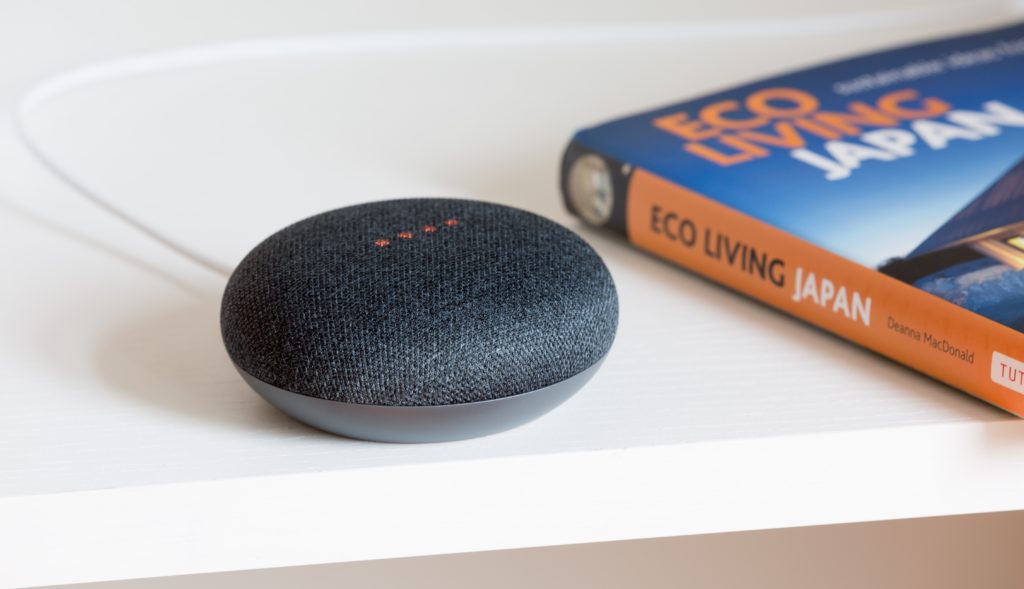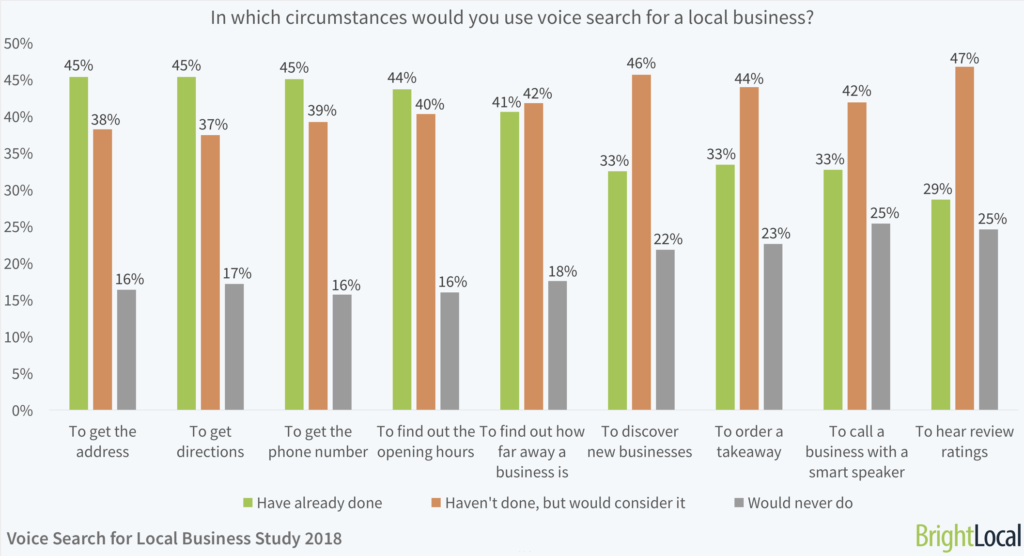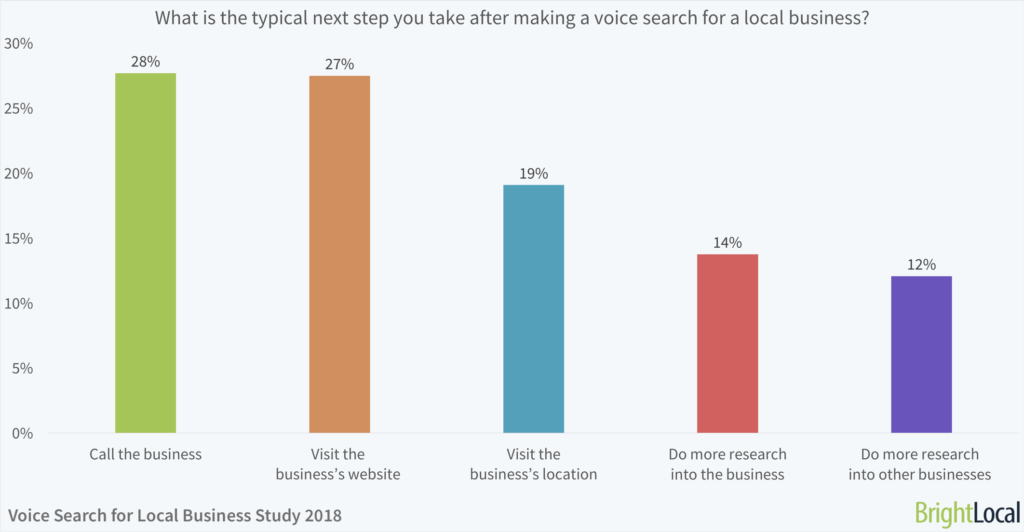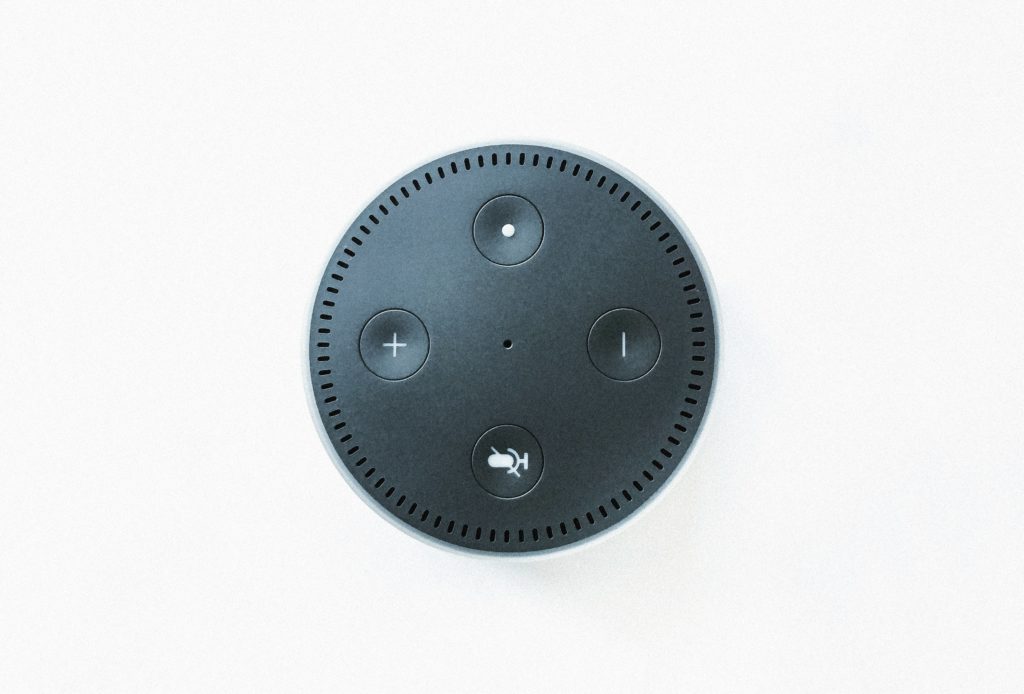
2016 marked Google’s astonishing report that 20% of all searches were being done by voice. With 2020 on the horizon and voice technology experiencing rapid growth, I’ve wondered who might benefit most from voice SEO for local business.
Based on a 2018 study by BrightLocal, food industry brands are likely to benefit most from voice SEO for local business. This includes restaurants, grocery stores, and food delivery among the most frequently searched. Commonly, consumers are seeking more information right before making a shopping decision.
BrightLocal’s research made it simple: the best candidates for local voice SEO likely include brick-and-mortar service industry businesses. Food was on top, but decent traffic was cited across many business types.
Many of these businesses already have active SEO strategies. However, your existing search optimization may not be enough as the demand for voice search rises. Voice search puts results differently across different digital assistants. That means your voice strategy may not guarantee a spot in Alexa’s ranks.
There’s great news in this: Google Assistant and Siri still dominate the mobile search market. Since the smartphone market is much bigger than the current adoption of smart speakers, we’ve got a clear route to begin optimizing for voice search.
To catch the majority of local voice users, we can optimize for Google voice results. Both Android and Apple use Google results by default, so you’ll be in good company.
That said, we can only optimize if we identify “what” voice users search for and “why.”
In this article, I’ll explore how consumers use voice search for local business.
In the process, I will answer some important questions around local voice search.
These will include:
- What do voice search users want from local business searches?
- When are consumers using voice search to search local businesses?
- Does a consumer take action after a local business voice search?
- How can a small business take advantage of local voice search?
What do consumers want when using local voice search?
To make voice search a valuable part of your business, you must first know what information your audience is searching for.
Local voice search consumers tend to look for information to contact, locate, or learn more about businesses nearby. More often, they’ll search for businesses they already know about. Users choose voice when they quickly need basic info to help them plan an upcoming transaction.

To put it simply, your business will be getting most voice search traffic from people looking to find or contact you.
Google voice results currently serve most local information in these categories: basic operational info, purchase planning, and transactions.
Basic operations information via “near me” search will return business hours, location, phone number, and directions. These are the most commonly requested.
Purchase planning requests can also include product prices, business ratings, and more. BrightLocal’s findings show that product availability is the most likely request.
Transaction search queries are a bit more complex by offering reservation bookings and voice-based purchases. These actions are used less frequently but will rise as consumers become more confident in their voice assistants.
In general, you should at least offer your most basic contact and location information online. This will prepare you to be a candidate for nearby search listings.
Where are local voice search users in the buyer’s journey?
By now, you’re probably curious when voice searchers are asking for business info.
Local voice search generally is used in the planning stage of a buyer’s journey. They know what they want, but they may not be ready to buy immediately. A “nearby” query is used to find businesses that have what a consumer needs. They’ll decide if your prices, hours, and location are ideal before going to buy.
Users are obviously looking to meet basic needs for a stress-free purchase: value, convenience, and quality.
Looking at basic marketing logic will help us understand how to position your most vital business info in local search.
Convenience
Convenience is the main local business feature voice assistants share with your audience. This quickly rises in importance if their needs are time-sensitive.
To explain, auto mechanics and restaurants answer the same basic questions in a voice search. That question will be:
“Are you close, and can you help me as soon as I need your services?”
Your hours and location will help this question get answered properly.
Whether you’re open, where you are, and how far you are will help them weed out the frustrating options over the ones most likely to deliver exactly what they need.
Quality
Quality is another major factor in shaping a successful conversion for digital assistant users. Usually this is boosted by social buzz around your business online.
Restaurants prove their quality on Google through business reviews. This tends to be fueled by testimonials and ratings added directly on Google business listings.
Reviews answer another basic question for search users:
“Will I be happy with my purchase?”
In some cases, a great set of reviews can justify higher prices to a search user. If your business is in a “top-rated nearby” search, your services may be worth a premium.
While you can’t make people give you 5-star reviews, you can set up the platform to encourage them to do so. Be sure to claim your Google My Business page!
Value
Value is the closer of a voice user’s journey to plan a purchase. Your pricing combined with convenience and quality will be the deciding factors when and if a user will buy.
You can feed Google your product prices to give users a quick comparison point.
However, Google needs context to connect the dots between a pricing voice search question and your products. Schemas provide context to solve this problem.
Nearly every buyer will have the following questions at some point:
“Can I pay for this? Will I pay for this?”
Pricing is easier to list for products as they have easier points of comparison. This can especially be important for retail stores, restaurants, and grocery stores.
Service price listings can be more challenging, since you may price based on the scope of your projects. Fortunately, voice users may not be searching for speedy service and cost may not be a deciding factor.
Do voice searchers take action to contact a local business?
You may wonder if a nearby voice search will turn into a purchase for your business.
Local voice search users follow-up with a business surprisingly often. Nearly 3 in every 10 local voice searches leads to a phone call or website visit. Even better, around 1 of 5 searchers will actually visit a business following a local voice query. These follow-ups increase the potential to convert leads to sales significantly.

The biggest takeaway from LocalBright’s research is that voice search local results can help lead to a business being contacted.
With nearly 30% of local business searches via voice pulling a business call, your chances of making a sale go way up. In fact, phone calls convert customers 10x more than online interactions.
Voice, the most natural form of communication, is the fastest path to basic business info. As a result, consumers using vocal-based search may be primed to make phone calls.
Of course, your audience will only contact if you’re providing enough search info to meet their needs. It’s up to you to at least prepare your web copy and content for basic voice search standards.
How can your local business gain more voice searches?
The rise of voice search means we must optimize a bit differently than we used to.
Optimize your local business for voice search by making your website helpful. Claim your Google My Business listing to provide answers for basic local voice queries. Further voice SEO will come from writing your FAQ and blog content in a conversational tone. You can also feed rich search results by adding schemas to your site.
Local voice SEO will drive brands in a marketing race into 2019 and beyond.
As a result, experts will try to sell you advanced techniques to pass Google’s ranking tests. Tests change, and those who barely passed before will fail in the future.
The real secret to all SEO is to give people the most helpful resources on the web. Shocker, right? You lose search traffic if your website isn’t helpful or easy to use.
By that logic, optimizing for voice is going to be easier than every SEO “expert” will make it seem. Voice search is just a push towards creating a natural user experience.
Your goal is to make your brand’s web experience as natural and useful as possible.
What can I do to get started on local business voice SEO?
Based on my research, Search Engine Land has some great business SEO advice.
I’ll run you through simple voice SEO tips you can begin today:
- Claim your Google My Business listing and complete your profile.
- Feed conversational content to Google via your web pages.
- Use schema markups to boost rich result rankings.
These SEO tips are all simple, but some may take more time to work on than others. I’ve ordered them from quickest to longest, with Google’s business listings to start.
You can begin to optimize for voice by claiming your Google My Business profile. Completing your profile allows users to easily locate and contact you via voice search.
On your website, you should create your FAQ page with a conversational Q&A tone. Voice users make hyper-specific requests, and Google uses FAQs as a great reference for useful, to-the-point answers.
Your website also needs fresh, original blog content with conversation-style writing. Regular blog posts are used to tell Google that your website is active and relevant.
Your blog content and web copy should answer your business’ common search questions. This is a reliable way to keep your site ranked against your competition.
Blog content should also go deeper beyond the initial question to target deeper “follow-up questions.” While this is better for text SEO, you may pull voice users too.
Should your local business aim to get voice searches?
In summary, your local business should absolutely prepare for voice search users. The returns of voice SEO may not be immediate, but will rise dramatically in the coming decade.
By now, you know that user experience comes first in voice search and general SEO.
If you focus on delivering a helpful and direct web experience, you’ll improve your chances for ranking across both voice search and traditional searches.
Ultimately, experience-driven SEO will stand up to any Google updates. This method encourages useful content, which will make any search engine love your brand.
